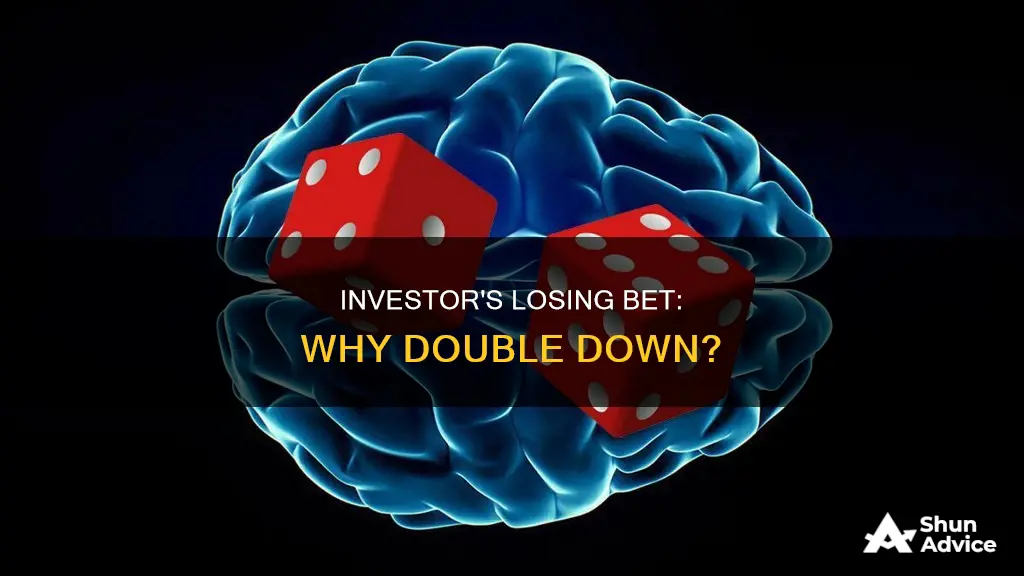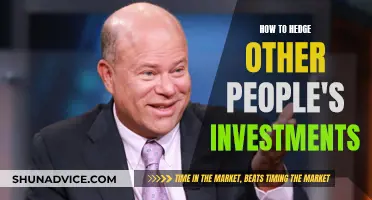
There are several reasons why people double down on losing investments. One of the main reasons is loss aversion, a cognitive bias where the pain of losing feels more intense than the pleasure of winning. People tend to avoid losses more than they seek gains, and this can lead to impulsive decisions such as doubling down on a losing investment in the hopes of turning it around.
Another reason is cognitive dissonance, which occurs when people experience stress or discomfort from holding two contradictory thoughts, beliefs, or opinions. Rather than admit they are wrong, people may double down on their initial beliefs, even in the face of contradictory evidence. This can be seen in various aspects of life, from politics to personal investments.
Additionally, some investors may double down on losing investments due to a psychological effect where the arbitrary goal is to break even. In this case, investors may be motivated by the desire to avoid being branded a loser rather than making a rational financial decision.
Finally, some investors may double down on losing investments if they believe the stock will perform well in the future or if they have deep enough pockets to ride out the losses. However, this can be a risky strategy, as markets never move in one direction, and picking the wrong stock can result in significant financial losses.
| Characteristics | Values |
|---|---|
| Cognitive dissonance | The stress of holding two contradictory thoughts, beliefs, opinions, or attitudes |
| Loss aversion | Wanting to avoid a loss and doing all to reduce the chance of it happening |
| Endowment effect | Placing more value on something owned than something not owned |
| Disposition effect | Holding on to losing investments for too long and selling winning investments too quickly |
What You'll Learn

The fear of losing money
For example, investors may opt for low-risk savings accounts instead of investing in the stock market, due to the fear of losing money. While this is a safer option, it could result in them not having enough funds for retirement, especially when factoring in inflation.
When it comes to investing, loss aversion can cause investors to become indecisive and unsure about when and where to invest. They may hold on to plummeting stocks, hoping for a recovery, or make impulsive, unwise investments to try to make up for previous losses. This can lead to further losses, as investors may end up throwing good money after bad.
So, why do people choose to double down, despite the risks? One reason is cognitive dissonance, which is the stress experienced when holding two contradictory thoughts or beliefs. When faced with information that contradicts their existing beliefs, people often double down on their initial belief, even in the face of evidence. This allows them to reduce the dissonance and feel better, at least in the short term.
In the context of investing, cognitive dissonance can lead investors to refuse to admit that a particular investment or strategy is failing. Instead of acknowledging their mistakes and pivoting to a more profitable path, they double down to preserve their self-esteem and avoid the discomfort of cognitive dissonance.
However, refusing to admit mistakes can also make investors less open to constructive criticism and new information, hindering their ability to improve and make better decisions in the future.
Depression-Era Investments: Where Money Went
You may want to see also

Loss aversion
People with loss aversion tend to feel the losses two to three times more than they feel the equivalent gains. This bias leads them to take actions to avoid losses rather than those that will result in gains. For example, holding on to something well past its usefulness, such as a gym membership, or making impulsive decisions when investments underperform.
In the context of investing, loss aversion can cause people to make overly cautious and low-risk investment choices, such as putting money in a savings account instead of investing in the stock market. While these choices may seem safe, they could result in lower returns over time and may not be enough for retirement. Loss aversion can also make it difficult for investors to let go of plummeting stocks, as they focus more on avoiding losses than making profits.
Additionally, loss aversion can lead to doubling down on losing investments. When an investment's value drops, the only way to break even is for its value to double. This creates a psychological effect where investors are driven by the desire to avoid being branded a loser. As a result, they may double down by investing more in the hope of recovering their losses. However, this strategy can be risky, and investors need to be cautious and well-informed when employing it.
To handle loss aversion, it is important to stay emotionally detached from investments and separate feelings from financial decisions. Creating "speed bumps" that slow down financial decision-making can help ensure that impulsive choices are not made. It is also crucial to seek independent financial advice when needed.
Marijuana Investing: Overcoming Investor Fear
You may want to see also

Cognitive dissonance
When people experience cognitive dissonance, they are averse to the inconsistencies within their own minds and are motivated to resolve the negative feeling that results. This can lead to a range of responses, from ignoring the source of dissonance to changing one's beliefs or behaviours to eliminate the conflict.
For example, a person who holds the belief that they are fundamentally honest may experience cognitive dissonance if they tell a lie. They may then try to resolve this dissonance by denying or rationalising their dishonest behaviour, or they may change their behaviour by refraining from lying in the future.
However, doubling down on a losing investment can be problematic, as it may lead to further losses. Instead, it may be more prudent to acknowledge the dissonance and adjust one's investment strategy accordingly.
Young Investors: Why the Apathy?
You may want to see also

Self-esteem
People with low self-esteem tend to have a poor opinion of themselves, lack confidence in their abilities, and feel they have little control over their lives. They may also struggle to set boundaries with others and are more susceptible to mental health conditions such as anxiety and depression.
So, how does this relate to doubling down on losing investments?
Well, it's important to note that doubling down on a losing investment is generally considered a mistake due to its arbitrary nature and the psychological traps involved. A key factor at play is the investor's desire to avoid being branded a loser and the need to break even. This can lead to self-bargaining, where the investment is framed as more reasonable, even though it may not be a wise decision.
Now, let's explore the potential connection to self-esteem. Individuals with low self-esteem often struggle with negative thoughts, self-criticism, and negative self-talk. They may have a poor opinion of themselves and their abilities, which could extend to their investment choices. When faced with a losing investment, instead of cutting their losses, someone with low self-esteem might double down as a way to avoid feeling like a failure. It could be a way to maintain a sense of control and avoid the pain of losing. Additionally, they may struggle to accept that they made a mistake, which could lead to further justification of their losing investment.
On the other hand, individuals with healthy self-esteem are more likely to have confidence in their abilities and feel empowered to make changes in their lives. When it comes to investments, they might be more open to admitting mistakes and cutting their losses rather than doubling down. They are also more likely to seek support and advice from others, which could help them make more informed investment decisions.
In summary, while the decision to double down on a losing investment is influenced by various psychological factors, self-esteem can play a role in how individuals perceive and respond to their investment losses. Those with low self-esteem may be more prone to doubling down to protect their sense of self-worth, while those with healthy self-esteem may be better equipped to make rational decisions and seek support when needed.
China's Bubble: Global Investment Risk
You may want to see also

Irrational behaviour
People tend to double down on losing investments due to a range of psychological factors that influence their decision-making.
Loss Aversion
Loss aversion is a cognitive bias where the pain of losing is more significant than the pleasure of winning. People generally feel the pain of losses more acutely than the joy of equivalent gains. This bias leads to a tendency to avoid losses rather than take actions that could result in gains. For example, holding on to a gym membership long after it has stopped being used. In the context of investing, loss aversion can cause people to make impulsive decisions, such as doubling down on a losing investment, in an attempt to avoid the emotional pain of accepting a loss.
Cognitive Dissonance
Cognitive dissonance is the stress experienced when holding two contradictory thoughts, beliefs, or opinions. When faced with information that contradicts their existing beliefs, people often double down and amplify their initial belief, despite the evidence. This behaviour is a dissonance reduction technique used to reduce the unpleasant psychological state caused by conflicting thoughts. For example, a losing investor may double down on their investment, refusing to accept that it was a mistake, to reduce the cognitive dissonance they experience.
Self-Esteem Preservation
The desire to preserve self-esteem and avoid discomfort can also lead to doubling down on losing investments. Admitting fault can be uncomfortable, and people may double down to maintain a sense of personal power and control. Research suggests that refusing to apologise or admit a mistake provides a short-term boost to feelings of personal power. This can influence investors to double down on a losing investment rather than admit they were wrong, even if it may lead to further losses.
Endowment Effect
The endowment effect is a bias where people place a higher value on something they own compared to something they don't. This can cause investors to hold on to losing investments long after they have become irrelevant or detrimental to their goals. They become attached to their investment choices and would rather continue losing money than let go and invest in something more reliable.
Disposition Effect
The disposition effect is closely linked to loss aversion. It refers to the tendency to hold on to losing investments too long while selling winning investments too quickly. Investors who fall prey to this effect may double down on losing positions, causing further damage to their portfolios.
Hope for Future Performance
The hope that a stock will perform well in the future is another reason why people double down on losing investments. This strategy can keep investors in the game for a long time if they have deep enough pockets and choose fundamentally sound stocks. However, it is essential to recognise that markets never move in one direction, and doubling down on the wrong stock can lead to significant losses.
Inheriting Wealth: How to Invest
You may want to see also
Frequently asked questions
In the context of investing, "doubling down" refers to a strategy where you increase your position in a losing investment by buying more of the same asset, with the goal of lowering your average entry price. This approach can be risky, as it increases your exposure to the investment, but it may also allow you to recover losses if the asset's value increases in the future.
There are several psychological factors at play when people double down. One is "loss aversion," a cognitive bias where the pain of losing feels stronger than the pleasure of gaining. People may double down to avoid the discomfort of taking a loss and to maintain a sense of control. Another factor is "cognitive dissonance," where people amplify their initial beliefs when faced with contradictory information. This can lead to a refusal to accept new information and a doubling down on their original stance.
Doubling down can be a viable strategy when the underperformance of an investment is due to a simple market correction or unforeseen event, and the fundamentals of the investment remain strong. It's important to do proper research and understand what caused the investment to decline before considering this move. Additionally, having deep pockets and a long-term perspective can make this strategy more feasible.
The main risk of doubling down is that it can lead to significant losses if the investment continues to perform poorly. Picking the wrong stock or doing it blindly can wipe out your entire trading account. It's crucial to understand that markets are volatile and can move in unpredictable ways. Additionally, doubling down can make it harder to admit mistakes, limiting your ability to learn from them and make more informed decisions in the future.







